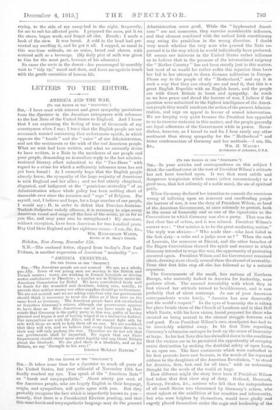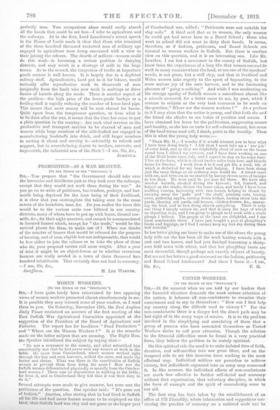[TO TIM EDITOR OP sea s SPECTATOR. "'] Sin,—In your articles
and correspondence on this subject I think the cardinal error at the root of President Wilson's attitude has not been touched upon. It was that most subtle and dangerous temptation which comes (often unconsciously) to a good man, that last infirmity of a noble mind, the sin of spiritual pride.
When Germany declared her intention to commit the conscious wrong of inflicting upon an innocent and unoffending people the horrors of war, it was the duty of President Wilson, as head of the American Government, at once solemnly to protest, both in the name of humanity and as one of the signatories to the Conventions to which Germany was also a party. That was the first clear line of action, and it was refused. President Wilson's answer was : " Our mission is to be the great mediating nation." The reply was obvious—" Who made thee—who hast failed in the first duty—a ruler and a judge over us Y " When the sack of Louvain, the massacre at Dinant, and the other breaches of the Hague Conventions showed the spirit and manner in which Germany intended to wage this war, the opportunity of protesting occurred again. President Wilson and his Government remained silent, drawing more closely around them the shroud of neutrality. From that first false step all else has followed as by a natural sequence.
The Governments of the small, free nations of Northern Europe, who naturally looked to America for leadership, were perforce silent. The amazed incredulity with which they at first viewed her attitude turned to bewilderment, and is now probably that of silent contempt. As one of your American correspondents wrote lately, " America has now deservedly lost the world's respect." In the oyes of humanity she is taking her place beside those of the Church of Laodicea and in that Hell which Dante, with his keen vision, found prepared for those who insisted on being neutral in the eternal struggle between evil and good. Even President Wilson's own standpoint has had to be inevitably whittled away. In his first Note regarding Germany's submarine outrages he took up the cause of humanity at large. In his last Note this has dwindled down to the condition that the victims are to be permitted the opportunity of escaping entire destruction by seeking the doubtful safety of open boats in an open sea. The finer sentiments which were embodied in his first protests have now become, in the words of his reported address to the daughters of the American Revolution, " to stand for America, first, last, and for all time," with no redeeming thought for the needs of the world at large.
How different might the story have been if President Wilson had taken that first clear stop of duty. Holland, Denmark, Norway, Sweden, &c., nations who felt that the independence of all small States was threatened by Germany's action, who stood aghast at the exhibition of her cruelties and inhumanity, but who wore helpless by themselves, would have gladly and eagerly placed themselves under the aegis and leadership of the perfectly true. Two occupations alone would easily absorb all the hands that could be set free—I refer to agriculture and the railways. As to the first, Lord Lansdowne's recent speech in the House of Lords made it clear that those who remained Of the three hundred thousand unstarred men of military age engaged in agriculture were being canvassed with a view to their joining the colours. The dearth of milkers—women could do this work—is becoming a serious problem in dairying districts, and may result in a shortage of milk in the large towns. As to the second, the congestion of traffic at important goods centres is well known. It is largely duo to a depleted railway staff. Agriculturists, hard put to it for labour, would instantly offer reproductive work to thousands of men (Originally from the land) who now work in makings or drive lorries of barrels along the roads. There is another aspect of the problem—the high price of the lower-grade barleys as a feeding-stuff is rapidly reducing the number of home-bred pigs. This means that more money will be sent abroad for bacon. Quito apart from the temperance question, or from what is to be done after the war, it seems that the time has come to put a plain question to the country : Are such vital services as the productive and transport services to be starved of men and *omen while large numbers of the able-bodied are engaged in manufacturing foodstuffs into drink, and still larger numbers in carting it about and serving it—ostensibly to refresh and support, but in overwhelming degree to weaken, enervate, and impoverish, the industrial arm of the State ?—I am, Sir, &c.,
AGRICOLA.





















































 Previous page
Previous page